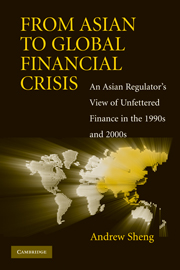 From Asian to Global Financial Crisis
From Asian to Global Financial Crisis Book contents
- Frontmatter
- Contents
- List of Figures
- List of Tables
- Acknowledgements
- Introduction
- 1 Things Fall Apart
- 2 Japan and the Asian Crisis
- 3 The Beam in Our Eyes
- 4 Banking: The Weakest Link
- 5 Washington Consensus and the IMF
- 6 Thailand: The Karma of Globalization
- 7 South Korea: Strong Body, Weak Heart
- 8 Malaysia: The Country That Went Its Own Way
- 9 Indonesia: From Economic to Political Crisis
- 10 Hong Kong: Unusual Times Need Unusual Action
- 11 China: Rise of the Dragon
- 12 From Crisis to Integration
- 13 The New World of Financial Engineering
- 14 What's Wrong with Financial Regulation?
- 15 The Global Financial Meltdown
- 16 A Crisis of Governance
- From Asian to Global Crisis: Chronology of Notable Events
- Abbreviations and Acronyms
- Bibliography
- Index
- Frontmatter
- Contents
- List of Figures
- List of Tables
- Acknowledgements
- Introduction
- 1 Things Fall Apart
- 2 Japan and the Asian Crisis
- 3 The Beam in Our Eyes
- 4 Banking: The Weakest Link
- 5 Washington Consensus and the IMF
- 6 Thailand: The Karma of Globalization
- 7 South Korea: Strong Body, Weak Heart
- 8 Malaysia: The Country That Went Its Own Way
- 9 Indonesia: From Economic to Political Crisis
- 10 Hong Kong: Unusual Times Need Unusual Action
- 11 China: Rise of the Dragon
- 12 From Crisis to Integration
- 13 The New World of Financial Engineering
- 14 What's Wrong with Financial Regulation?
- 15 The Global Financial Meltdown
- 16 A Crisis of Governance
- From Asian to Global Crisis: Chronology of Notable Events
- Abbreviations and Acronyms
- Bibliography
- Index
Summary
The only cause of depression is prosperity.
~ Clement JuglarTowards midnight on 30 June 1997, even the heavens cried for Hong Kong. The searing rain drenched me as I arrived at the brand-new new wing of the Hong Kong Convention and Exhibition Centre (HKCEC), where we watched an impeccably dressed white-uniformed People's Liberation Army soldier unfurling the red Chinese flag. Outside, HM Yacht Britannia, with Prince Charles and the last Governor Chris Patten on board, sailed out of Victoria Harbour against gusty winds and choppy waves.
The next day was one of celebration amidst an eerie calm as Hong Kong's citizens began to adjust to the return to Chinese sovereignty after 156 years of British colonial rule. Three days earlier, on 27 June, the Hong Kong Hang Seng stock market index (HSI) rose to a peak of 15,196. The rally was led by the euphoria surrounding shares of companies with Mainland China interests, known as Red Chips and H-shares. Property prices too were at a record high. Even the most optimistic of forecasters did not envision the buoyant sentiments the return of Hong Kong to China would evoke. As China promised, ‘There will be a better tomorrow’.
Things, however, began to fall apart.
WEDNESDAY, 2 JULY 1997
At around 4.30 a.m. on Wednesday, 2 July 1997, the Bank of Thailand (BoT) began calling top local and foreign bankers for an important announcement.
- Type
- Chapter
- Information
- From Asian to Global Financial CrisisAn Asian Regulator's View of Unfettered Finance in the 1990s and 2000s, pp. 21 - 43Publisher: Cambridge University PressPrint publication year: 2009


